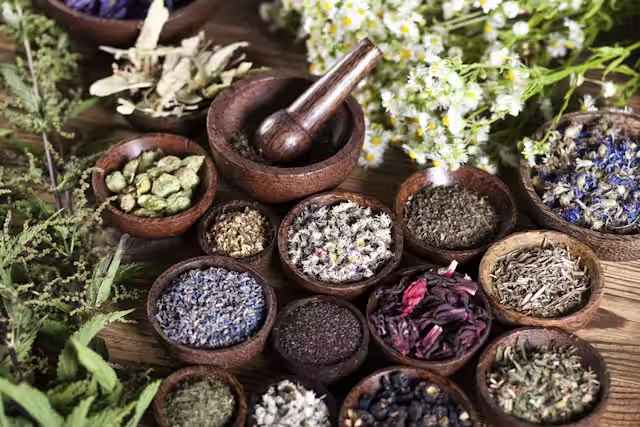🌱 Introduction
Long before pharmacies, synthetic drugs, and lab-created supplements, people turned to nature for healing. Herbs were more than just plants; they were medicines passed down through generations. Today, while some dismiss these as folklore, modern science is finally validating what our ancestors knew: herbal remedies can work—and sometimes, astonishingly well.
In this article, we’ll explore 10 ancient herbal remedies used for centuries across cultures that are now supported by scientific research. These aren’t miracle cures—but they might just be the natural allies your body has been waiting for.
🌿 1. Turmeric – The Golden Healer
🔍 Ancient Use:
Originating in India over 4000 years ago, turmeric was used in Ayurveda to treat inflammation, skin issues, and digestion problems.
🧪 Backed by Science:
Turmeric contains curcumin, a powerful anti-inflammatory compound. Studies show it can reduce joint pain, support brain health, and act as a natural antioxidant.
✅ How to Use:
- Mix ½ tsp in warm milk (Golden Milk)
- Take as a standardized supplement
- Add to curries and stews
🍃 2. Ashwagandha – The Stress Shield

🔍 Ancient Use:
Known as the “Indian Ginseng,” Ashwagandha was revered for boosting energy, stamina, and mental clarity in ancient Ayurvedic practices.
🧪 Backed by Science:
Research confirms it helps reduce cortisol (stress hormone) levels, improve sleep, and support thyroid function.
✅ How to Use:
- 300–500 mg extract daily
- Brew dried root into tea
- Mix powder with smoothies
🌸 3. Chamomile – The Calming Flower
🔍 Ancient Use:
Used in ancient Egypt, Greece, and Rome as a tea for relaxation and healing wounds.
🧪 Backed by Science:
Modern trials show chamomile tea may reduce anxiety, aid sleep, and soothe gastrointestinal issues.
✅ How to Use:
- Steep dried chamomile flowers for 5–10 minutes
- Use essential oil in aromatherapy
- Add to warm baths for calming effects
🌾 4. Licorice Root – The Digestive Ally
🔍 Ancient Use:
Employed by Chinese and Middle Eastern healers for ulcers, coughs, and digestive issues.
🧪 Backed by Science:
Contains glycyrrhizin, which has been shown to soothe the gut lining and help with acid reflux and eczema.
⚠️ Caution:
Excessive use can raise blood pressure—look for DGL licorice if concerned.
🍃 5. Ginseng – The Energy Booster
🔍 Ancient Use:
Used for over 5000 years in Traditional Chinese Medicine to improve stamina and mental performance.
🧪 Backed by Science:
Studies link ginseng to improved cognitive function, immune health, and reduced fatigue.
✅ How to Use:
- Brew root into tea
- Take capsules (100–400 mg/day)
- Combine with honey for an energy tonic
🌿 6. Garlic – The Natural Antibiotic
🔍 Ancient Use:
Used by ancient Egyptians and Greeks for infections, parasites, and even strength enhancement.
🧪 Backed by Science:
Garlic contains allicin, which has antibacterial, antiviral, and heart-protective effects.
✅ How to Use:
- Eat raw (1–2 cloves daily)
- Add crushed garlic to meals
- Take odorless garlic supplements
🍃 7. Peppermint – The Gut Soother
🔍 Ancient Use:
Used by the Romans and Egyptians to aid digestion and freshen breath.
🧪 Backed by Science:
Studies show peppermint oil can relieve symptoms of IBS (Irritable Bowel Syndrome) and relax stomach muscles.
✅ How to Use:
- Brew as a tea
- Take enteric-coated capsules
- Use peppermint oil for topical pain relief
🌼 8. Echinacea – The Immunity Builder
🔍 Ancient Use:
Native American tribes used echinacea root to treat infections and wounds.
🧪 Backed by Science:
May stimulate immune activity and reduce the duration of colds and respiratory infections.
✅ How to Use:
- Tincture or tea at first sign of illness
- 300–500 mg capsules
- Not recommended for long-term daily use
🌿 9. Milk Thistle – The Liver Guardian
🔍 Ancient Use:
Used in Greco-Roman medicine as a remedy for liver and gallbladder issues.
🧪 Backed by Science:
Its active ingredient, silymarin, has shown potential in detoxifying the liver and aiding people with fatty liver disease.
✅ How to Use:
- 150–300 mg extract per day
- Combine with dandelion root in herbal detox blends
🌾 10. Aloe Vera – The Skin & Gut Healer
🔍 Ancient Use:
Used by ancient Egyptians, who called it the “plant of immortality” for its skin-healing powers.
🧪 Backed by Science:
Supports healing of burns, wounds, and may aid digestion and gut inflammation when taken internally in small doses.
✅ How to Use:
- Apply fresh gel topically for burns
- Drink aloe juice (1–2 oz/day) for digestion
- Use in skincare for hydration
🌿 Modern Caution: Natural Doesn’t Mean Harmless
Even though these herbs are natural, they aren’t risk-free. Some can:
- Interact with medications
- Cause allergic reactions
- Be harmful in large amounts
Always consult a qualified healthcare provider before starting any herbal supplement, especially if you have a medical condition or are pregnant.
🌟 Why Science Is Now Catching Up
The revival of herbal medicine isn’t just a trend—it’s the result of modern research validating age-old wisdom. With advanced tools, scientists are identifying the active compounds in herbs and testing their effects in clinical settings.
This marriage of ancient knowledge and science is giving people more natural choices for health and wellness—without the side effects of synthetic drugs.
🧘 How to Integrate Herbal Remedies into Your Life
- Start small – Choose 1–2 herbs based on your needs.
- Go organic – Quality matters in herbs.
- Choose trusted sources – Herbal supplements should be third-party tested.
- Stay consistent – Herbal healing is gentle and gradual.
- Keep your doctor in the loop – Especially for chronic conditions.
🌿 Final Thoughts
The wisdom of ancient healers is no longer just folklore—modern science is proving much of it to be true. Herbs like turmeric, ginseng, garlic, and ashwagandha aren’t just passing trends. They’re time-tested, research-backed, and still incredibly relevant in the 21st century.
If you’re looking to support your body with natural solutions, these 10 ancient herbal remedies may be the safest place to start.
❓ Short FAQs
Q1: Are herbal remedies safe for everyone?
A: Not always. Some can interact with medications or cause side effects. Always consult a healthcare provider.
Q2: Do herbs really work like modern medicine?
A: Many herbs have shown scientific effectiveness, especially when used consistently and correctly.
Q3: Can I use multiple herbs together?
A: Yes, but be cautious about interactions and dosages. Combining too many may overwhelm your system.
Q4: How long does it take to see results from herbal remedies?
A: Unlike pharmaceuticals, herbs usually take days to weeks to show full effects.
Q5: Are herbal supplements better than fresh herbs?
A: Fresh is often better for flavor and some nutrients, but standardized supplements offer more consistent dosing.



